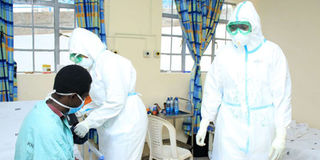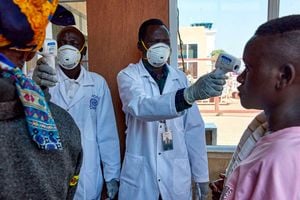Hospitals struggle to provide oxygen as Covid-19 cases rise

Medics attend to a Covid-19 patient in an isolation ward at the Kenyatta National Hospital's Infectious Disease Unit in Mbagathi, Nairobi.
Kenya could be experiencing a silent surge in the number of patients requiring oxygen as the country faces a new wave of Covid-19.
In the recent past, a number of Kenyans have tested positive for the virus, with many experiencing severe symptoms that warrant oxygen therapy to enable them to breathe.
Last week, Angela* went to one of the country's leading private hospitals after experiencing breathing difficulties. On arrival, she was told that all the machines were busy and that the number of Kenyans needing oxygen was quietly increasing.
She left and sought help at Kenyatta National Hospital, where she spent two days on oxygen to stabilise her breathing.
"I don't know what happened. It started with the loss of taste and smell. Then severe chest pain. I went for tests and tested positive for Covid-19. After two days it was severe, I couldn't breathe," she said.
She is not alone, three of her colleagues have also tested positive.
When Nation called the hospital, the response was that Kenyans should be careful as Covid-19 is still here.
"It is not a lie, we are seeing about four patients a day coming in needing oxygen, this is worrying because our machines have been treating other patients, not those with Covid-19. We should be worried," says an ICU nurse who is not authorised to speak to the media. This comes at a time when Kenyans have returned to their normal lives, with shaking of hands and no social distancing or testing. Vaccination has also stopped.
As the virus continues to circulate in the community, there is the possibility of a new, more dangerous sub-variant emerging. This comes at a time when Health Cabinet Secretary Susan Nakhumicha has lifted travel restrictions. A PCR test or proof of Covid-19 vaccination will not be required at points of entry, including the airport and borders.
As the Ministry of Health no longer publishes Covid-19 case numbers, it is unclear how many people are being infected, tested or vaccinated, which is useful for Kenya to take precautions and also to do its own risk assessment.
China is currently experiencing a new wave fuelled by XBB, which is expected to cause 65 million infections per week by June. In Beijing, the number of new infections has quadrupled in four weeks.
XBB is also causing smaller waves in other parts of the world, including India, Singapore and the United States.
XBB.1.16, the Arcturus variant, is a descendant of Omicron, with some reports suggesting it causes conjunctivitis or pink eye.
With passengers from different countries now entering the country without testing, Kenyans are also at risk.
"With the relaxed precautions, everyone should take personal precautions. Just wear a mask when you are outside, wash your hands and if you have severe symptoms, seek medical attention," said Dr Ahmed Kalebi, a consultant pathologist.
He said it was not clear whether there was a wave or not, but whenever there was an increase in the number of people testing positive, then the virus was definitely circulating.
"Just protect yourself. It may be difficult to know exactly what is causing the ongoing spike, just make sure you take precautions. Always wear masks," said Prof Shem Sam Otoi, the coordinator of the Lake Region Economic Bloc's Covid-19 Programme.
Global aviation and health agencies, including the World Health Organisation (WHO) and the Africa Centres for Disease Control and Prevention (CDC), have urged African countries to deploy public health officers at all international airports to review the screening of all passengers.
WHO Regional Advisor for Risk Management and Preparedness , Miriam Nanyunja, said public health officers in airports would help screen passengers and manage public health emergencies.
Speaking at the ninth African regional meeting of the Collaborative Arrangement for the Prevention and Management of Public Health Events in Civil Aviation in Mombasa, the experts said the Covid-19 protocols were essential to control and manage any medical emergency.





